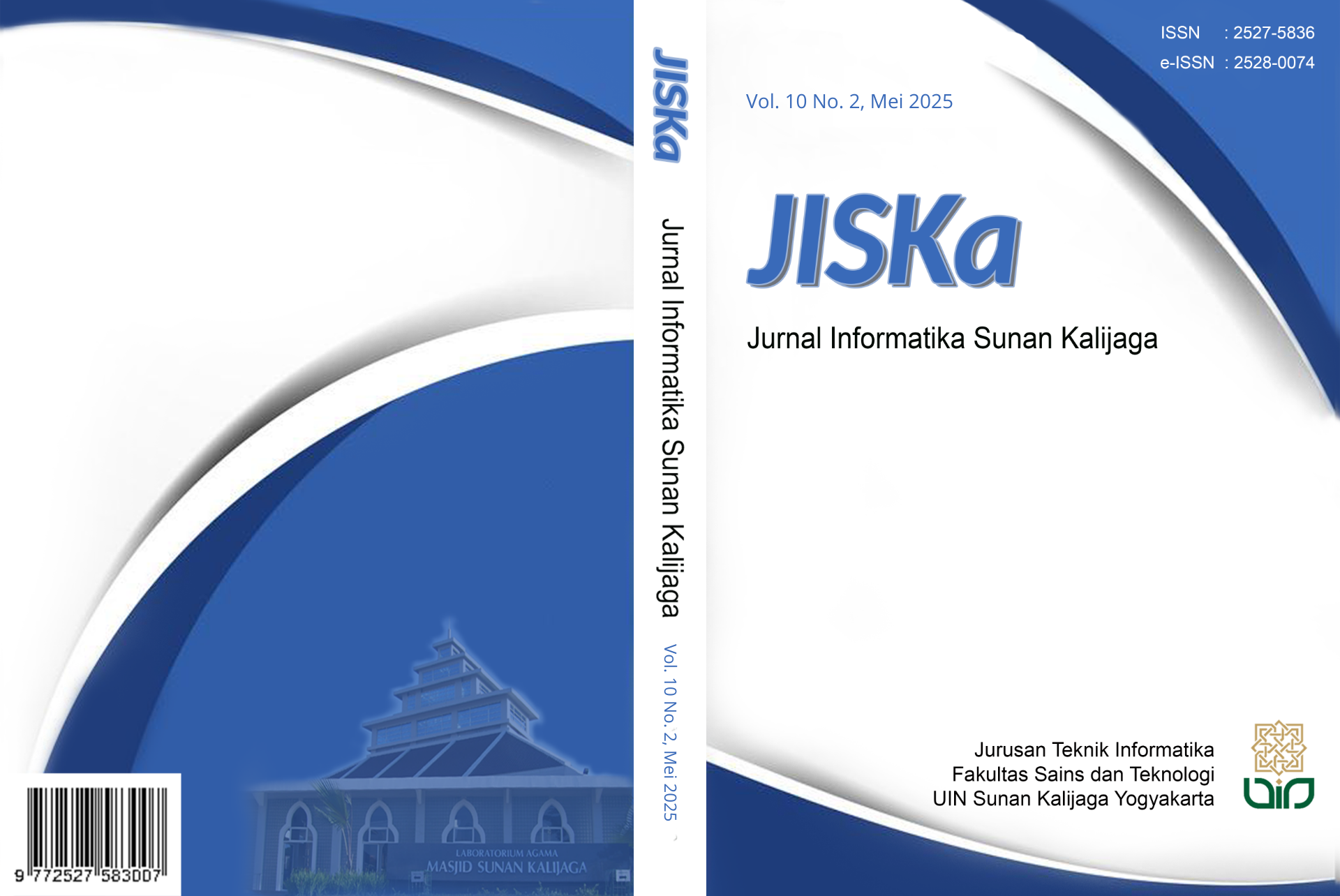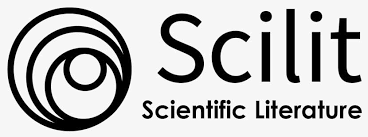Penggunaan Teknik Transfer Learning pada Metode CNN untuk Pengenalan Tanaman Bunga
DOI:
https://doi.org/10.14421/jiska.2025.10.2.195-206Keywords:
CNN, Transfer Learning, EfficientNetB3, VGG16, Flower RecognitionAbstract
This study explores the impact of using the transfer learning method to improve flower recognition performance using Convolutional Neural Network (CNN) models. The dataset used consists of 4242 flower images divided into five classes: daisy, tulip, rose, sunflower, and dandelion. This research implements three models: basic CNN, VGG16, and EfficientNetB3, to test the effectiveness of transfer learning in flower classification. The basic CNN model achieved a training accuracy of 73.38% and validation accuracy of 71.76%, but it is limited in generalizing to new data. The VGG16 model achieved perfect training accuracy but experienced overfitting, with validation accuracy stabilizing around 85-90%. Meanwhile, the EfficientNetB3 model with transfer learning reached a training accuracy of 98.50% and a validation accuracy of 94.00%, demonstrating strong generalization without significant overfitting. The experiment was conducted using data augmentation techniques, and performance evaluation was carried out using accuracy, precision, and recall metrics. The results show that transfer learning with the EfficientNetB3 model provides the best performance in flower classification compared to the basic CNN and VGG16 models. For future research, further development can be done by expanding the types of flower datasets and applying additional optimization techniques to improve accuracy in more complex models.
References
Alwanda, M. R., Ramadhan, R. P. K., & Alamsyah, D. (2020). Implementasi Metode Convolutional Neural Network Menggunakan Arsitektur LeNet-5 untuk Pengenalan Doodle. Jurnal Algoritme, 1(1), 45–56. https://doi.org/10.35957/algoritme.v1i1.434
Arianty, R., Maukar, M., & Lestari, O. B. (2022). Pengukuran Kemiripan Fitur pada Sistem Temu Kembali Citra Berbasis Konten Menggunakan Euclidian Distance. Jurnal Ilmiah Informatika Komputer, 27(1), 1–18. https://doi.org/10.35760/ik.2022.v27i1.6095
Danial, N. H., & Setiawati, D. (2024). Convolutional Neural Network (CNN) Based on Artificial Intelligence in Periodontal Diseases Diagnosis. Interdental Jurnal Kedokteran Gigi (IJKG), 20(1), 139–148. https://doi.org/10.46862/interdental.v20i1.8641
Darmanto, H. (2019). Pengenalan Spesies Ikan Berdasarkan Kontur Otolith Menggunakan Convolutional Neural Network. Joined Journal (Journal of Informatics Education), 2(1), 41. https://doi.org/10.31331/joined.v2i1.847
Drenyovszki, R. (2024). Solving a Classification Problem Using Transfer Learning on Small Image Datasets. Gradus, 11(1). https://doi.org/10.47833/2024.1.CSC.011
Falakhi, B., Achmal, E. F., Rizaldi, M., Athallah, R. R. R., & Yudistira, N. (2022). Perbandingan Model AlexNet dan ResNet dalam Klasifikasi Citra Bunga Memanfaatkan Transfer Learning. Jurnal Ilmu Komputer dan Agri-Informatika, 9(1), 70–78. https://doi.org/10.29244/jika.9.1.70-78
Fuadah, Y. N., Ubaidullah, I. D., Ibrahim, N., Taliningsing, F. F., Sy, N. K., & Pramuditho, M. A. (2022). Optimasi Convolutional Neural Network dan K-Fold Cross Validation pada Sistem Klasifikasi Glaukoma. ELKOMIKA: Jurnal Teknik Energi Elektrik, Teknik Telekomunikasi, & Teknik Elektronika, 10(3), 728. https://doi.org/10.26760/elkomika.v10i3.728
Harahap, M., Laia, E. M., Sitanggang, L. S., Sinaga, M., Sihombing, D. F., & Husein, A. M. (2022). Deteksi Penyakit Covid-19 pada Citra X-Ray dengan Pendekatan Convolutional Neural Network (CNN). Jurnal RESTI (Rekayasa Sistem dan Teknologi Informasi), 6(1), 70–77. https://doi.org/10.29207/resti.v6i1.3373
Ibrahim, N., Lestary, G. A., Hanafi, F. S., Saleh, K., Pratiwi, N. K. C., Haq, M. S., & Mastur, A. I. (2022). Klasifikasi Tingkat Kematangan Pucuk Daun Teh menggunakan Metode Convolutional Neural Network. ELKOMIKA: Jurnal Teknik Energi Elektrik, Teknik Telekomunikasi, & Teknik Elektronika, 10(1), 162. https://doi.org/10.26760/elkomika.v10i1.162
Li, Y., Lv, Y., Ding, Y., Zhu, H., Gao, H., & Zheng, L. (2024). Research on a Flower Recognition Method Based on Masked Autoencoders. Horticulturae, 10(5), 517. https://doi.org/10.3390/horticulturae10050517
Narvekar, C., & Rao, M. (2020). Flower Classification Using CNN and Transfer Learning in CNN- Agriculture Perspective. 2020 3rd International Conference on Intelligent Sustainable Systems (ICISS), 660–664. https://doi.org/10.1109/ICISS49785.2020.9316030
Nugroho, A. S. (2015). Analisis Keanekaragaman Jenis Tumbuhan Berbuah di Hutan Lindung Surokonto, Kendal, Jawa Tengah dan Potensinya Sebagai Kawasan Konservasi Burung. Prosiding Seminar Nasional Masyarakat Biodiversitas Indonesia. https://doi.org/10.13057/psnmbi/m010316
Nuraini, R., Destriana, R., Nurnaningsih, D., Daniarti, Y., & Alexander, A. D. (2023). Sunflower Image Classification Using Multiclass Support Vector Machine Based on Histogram Characteristics. Jurnal RESTI (Rekayasa Sistem dan Teknologi Informasi), 7(1), 146–152. https://doi.org/10.29207/resti.v7i1.4673
Saputra, T., Nurmaini, S., Roseno, M. T., & Syaputra, H. (2023). Heart Chamber Segmentation in Cardiomegaly Conditions Using the CNN Method with U-Net Architecture. Jurnal Sisfokom (Sistem Informasi dan Komputer), 12(3), 455–461. https://doi.org/10.32736/sisfokom.v12i3.1976
Tama, A. M., & Santi, R. C. N. (2023). Klasifikasi Jenis Tanaman Hias Menggunakan Metode Convolutional Neural Network (CNN). INTECOMS: Journal of Information Technology and Computer Science, 6(2), 764–770. https://doi.org/10.31539/intecoms.v6i2.7002
Widyaya, J. E., & Budi, S. (2021). Pengaruh Preprocessing Terhadap Klasifikasi Diabetic Retinopathy dengan Pendekatan Transfer Learning Convolutional Neural Network. Jurnal Teknik Informatika dan Sistem Informasi, 7(1). https://doi.org/10.28932/jutisi.v7i1.3327
Downloads
Published
How to Cite
Issue
Section
License
Copyright (c) 2025 Agustina Mufidatuzzainiya, Muhammad Faisal

This work is licensed under a Creative Commons Attribution-NonCommercial 4.0 International License.
Authors who publish with this journal agree to the following terms as stated in http://creativecommons.org/licenses/by-nc/4.0
a. Authors retain copyright and grant the journal right of first publication with the work simultaneously licensed under a Creative Commons Attribution License that allows others to share the work with an acknowledgement of the work's authorship and initial publication in this journal.
b. Authors are able to enter into separate, additional contractual arrangements for the non-exclusive distribution of the journal's published version of the work (e.g., post it to an institutional repository or publish it in a book), with an acknowledgement of its initial publication in this journal.
c. Authors are permitted and encouraged to post their work online (e.g., in institutional repositories or on their website) prior to and during the submission process, as it can lead to productive exchanges, as well as earlier and greater citation of published work.










